
Where's Waldo?
March 10th, 2010
Arguably Canada's most well-camouflaged bird: the Brown Creeper.

Having taken about twenty shots in rapid succession, I managed to catch a profile view of this guy: a rare occasion when a creeper was somewhere other than plastered to the bark of a tree, and virtually invisible.
Creepers are another year-round species. I log most of my sightings of them in winter and early spring, when they wander in diverse habitats in search of food. Like nuthatches they're little birds that creep along tree trunks and branches, probing the bark for food. (They survive in winter thanks to the presence of hibernating insects.) Unlike nuthatches, they can't climb back down; instead, having reached the top of one tree, they fly to the bottom of the next one and spiral up again. The presence of a creeper is announced--if you're lucky--by a faint high-pitched call, similar to a chickadee tweet, but more high-pitched and drawn out.
This is what a Brown Creeper sighting usually looks like:

Courtship Follies of the Common Merganser
March 9th, 2010
Photography along the Rideau yesterday morning was out. of. this. world. The lighting was glorious and all the ducks were out in full glory, preening and courting. I took home over 450 pictures to sort through.
The undisputed star of the day was the Common Mergansers. Seven males, one female--and they all wanted her. They came rollicking along while I was watching goldeneyes at Riverain Park. They were so engrossed in what they were doing that they really didn't seem to care how close they got to me.
For many ducks, courtship has something to do with odd contortions: Common Goldeneyes and Hooded Mergansers pop their heads back, Mallards bob their heads up and down. For some reason, neck flexibility is important enough to show it off. Not so the Common Mergansers. For them it's all about speed. Perhaps it's because they're fish-eaters. Fish-eaters are more likely to have a need for speed than, say, ducks who subsist on water weeds or mollusks.
So the males race and chase up and down the river, leaving a wake wherever they go. They chase each other, they chase the female, they posture and squabble. And sometimes the cheeky female gets right into the act!


1680x1050 wallpaper
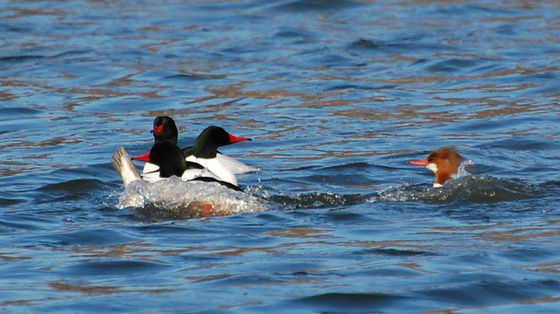
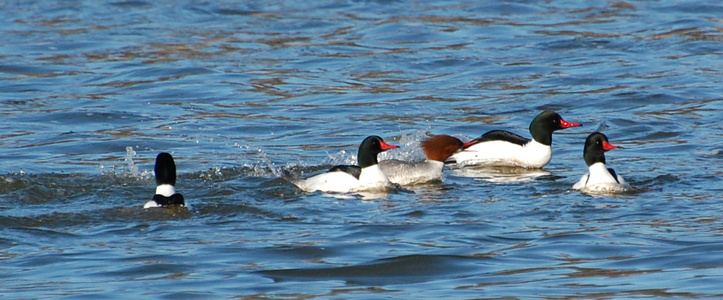
1680x1050 wallpaper
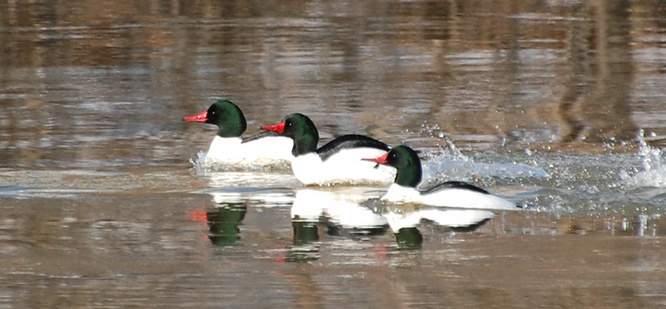
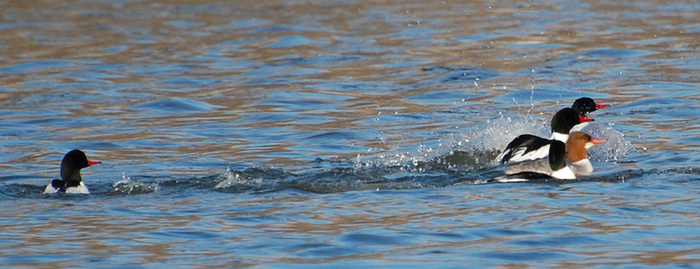
( And more... )
Some hairies
March 5th, 2010
Hairy Woodpeckers are Downy Woodpeckers' jumbo twins. They're 2-3 inches bigger, with disproportionately longer and stouter beaks, but otherwise identical. I find them more truly woodpecker-like in their mannerisms, while Downies often put me in mind of wannabe chickadees. But they're about as tame, and about as likely to show up at feeders. This one was haunting a suet feeder in the Hurdman woods, allowing me several excellent close-ups of him.


Every bird deserves its day
March 4th, 2010
Imported from Europe in the mid-nineteenth century, now scraping out a living in towns and cities across North America: the humble House Sparrow.

1680x1050 wallpaper

Chilly Crows
March 3rd, 2010

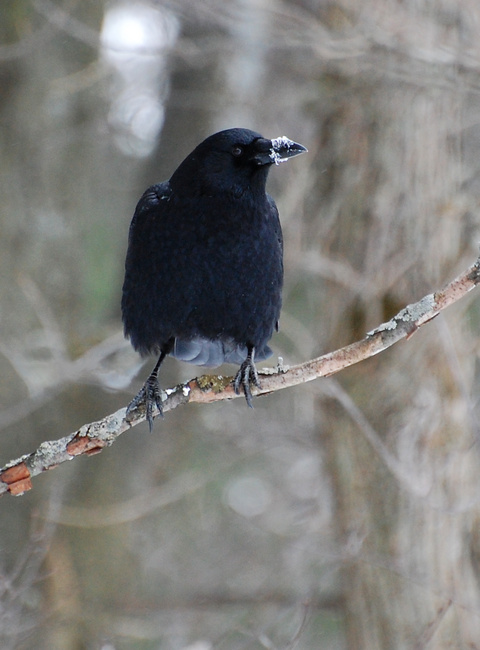
Standing Out
March 2nd, 2010

This is me playing with saturation.
I'll call it fate
March 1st, 2010
The Ottawa Field-Naturalists are doing a four-day birding trip to Point Pelee this May. Spring migration at Point Pelee is famous. It's one of the best spots for it in all North America. I've never been there before.
I called today and:
- Every single spot is taken--except one. (I had no idea it would fill up so
fast. Okay, so they warned me "reserve early to avoid disappointment", but I
thought they were just, you know, saying that.)
- The one remaining spot requires me to stay in a single-occupancy hotel
room for the duration, resulting in a trip cost of approximately $900 instead
of $450. Aiieee!
- I have a big wad of unspent gift money from last Christmas+birthday that just about totals the above.
February Goldeneyes
February 28th, 2010
The Rideau continues to support good numbers of Common Goldeneye, and, as with the neighboring Mallards, courtship is in full swing.

The juvenile male, second from the left, is doing a classic goldeneye showoff for the ladies: neck arched back, feet simultaneously kicking at the water.
Note the two oddballs in this picture: The male about 3/5 of the way to the right, with the dollop-shaped (instead of round) cheek patch and the spotted shoulder stripe, is a Barrow's Goldeneye--a rare species in the east, but one which winters in Ottawa each year in very small numbers (1-4). The redheaded duck in the upper left is a Common Merganser.

Eventually the females get interested, at which point they start doing the funky head motions too :-)

The wintering goldeneyes are easy to find, if you ever want to watch these fascinating ducks for yourself. Take a bus or drive to where Rideau Street crosses the river (Cummings Bridge), then walk south--preferably with binoculars! There are also usually some of them at Billings Bridge park.
Memories Of Green
February 27th, 2010
It's that time again...the time when I pull out some summery leftovers (actually they're from October, but you can pretend!) to tide us over until spring comes. These are all from Andrew Haydon Park.



Winter Downy
February 26th, 2010
Spotted this male Downy Woodpecker along the Rideau River on Monday.


After awhile a second male came along, and a territorial dispute ensued. This part was hard to photograph--the skirmishes were fast and furious!

|
